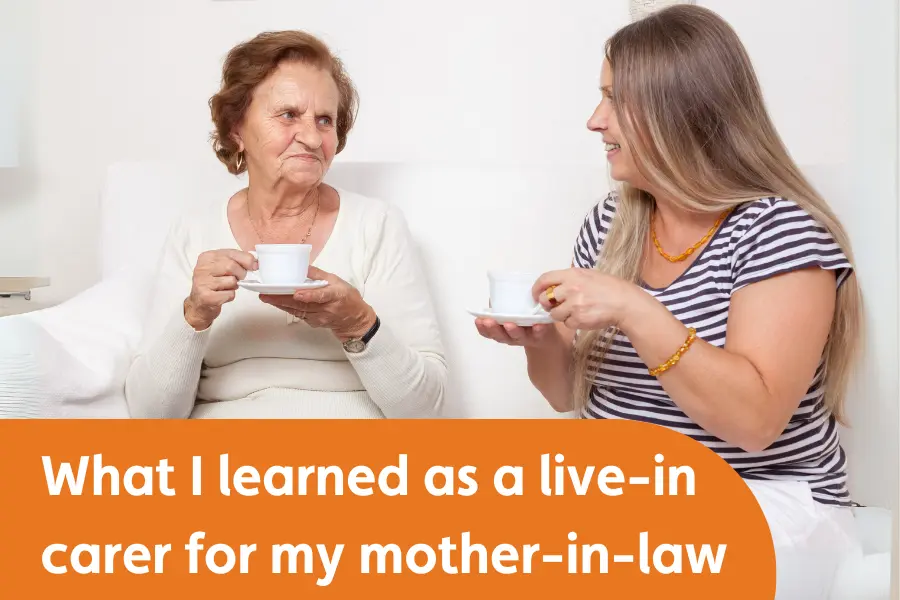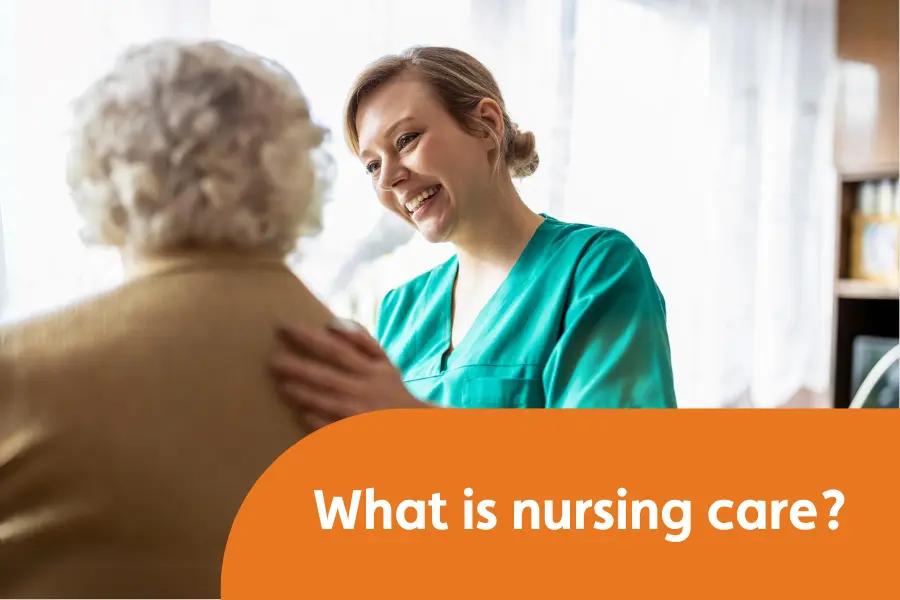After the festive season, many people will have spent time caring for a loved one at home. While this is a time to strengthen bonds and create special moments, it also comes with its share of challenges. Balancing your own needs with that of someone else’s, while rewarding, can feel overwhelming at times.
One of our team members experienced this first-hand recently when she took on the role of carer for her mother-in-law during a two-month stay in Spain. Below she shares her story, reflecting on the ups and downs of being a live-in carer, offering an honest glimpse into what it entails – including rewarding moments and the lesser-known realities of caregiving.
Whether you found yourself caring for a loved one over the festive season or are considering live-in care as a longer-term role, her experience offers insight into the many aspects of providing care and the meaningful connections it can bring. It explores the balance of managing daily routines, providing emotional support, and creating meaningful moments that bring comfort and dignity to those in your care.
Understanding Rose’s situation
“My mother-in-law, who we’ll call Rose, had been showing signs of memory loss and forgetfulness for some time, which we suspected might be early-stage dementia, although it was never formally diagnosed. Her late husband, before he passed away three years ago, had noticed the changes.
He would often tell my husband, ‘Watch her—she’s leaving pans on the stove,’ or joke gently that you couldn’t accept coffee from her because she’d end up giving you Bovril with milk instead. At the time, it was brushed off as a bit of forgetfulness, but it was clear he had been quietly worried about her.
“After her husband’s passing, Rose lived alone in their family home. She had always been the one to look after everyone else – her parents, the neighbours, anyone who needed her help – but now she was struggling to care for herself. Her once spotless home started to get dusty, and we began to notice that day-to-day living was becoming difficult for her.
“My brother-in-law and his wife, who lived nearby at the time, were doing their best to manage things on their own, but they didn’t share the full extent of Rose’s struggles with us. I believe they were trying to protect her and perhaps found the idea of seeking a formal diagnosis overwhelming or difficult to face.
“By the time we saw these changes for ourselves, the signs were undeniable. Rose was clearly struggling with her memory and her routines, and she seemed increasingly unsure of herself. We live in Spain, so it wasn’t until we visited her that we could fully appreciate how much she was struggling. It wasn’t just her memory—it was her confidence, her routine, and her ability to make decisions.
“Rose was always a private person, and her marriage had been quite traditional, with her husband often taking the lead. When we asked her opinion on things, she’d often say, ‘What do you think?’ and agree with whatever we said. It broke my heart to see how lost she sometimes seemed.
“Eventually, it was decided that Rose would move south with my brother-in-law. My husband and I worried that taking her to an unfamiliar place, far from her home and routine, might add to her confusion. Wanting to provide a sense of comfort and familiarity, we offered to have Rose stay with us in Spain for a while, where she had visited many times before. We hoped the familiar surroundings and our care would help her feel more secure.”
Helping Rose Settle In
“When Rose arrived, it became clear that reassurance was key to helping her feel at ease. She often asked, ‘Am I going home today?’ which was heartbreaking to hear. To provide comfort, I placed a note by her bed: ‘I am on holiday at my sons house in Spain.’ She checked it several times a day, and it seemed to bring her peace.
“Small adjustments made a significant difference. For instance, her suitcase stayed zipped because she didn’t recognise it as hers, and she wore the same clothes repeatedly, saying she couldn’t find anything else. To make things easier, I unpacked her belongings and arranged them visibly on a chair in her room. This helped her feel more organised and reduced her anxiety.
“I also noticed she constantly checked her house keys, which gave her a sense of security. Rather than discouraging this habit, I reassured her by saying, ‘Don’t worry, you’ve got your keys, everything’s fine.’ These little actions helped her feel more grounded and in control.”
Making mealtimes a positive experience
“Rose has a sweet tooth, but she wouldn’t ask for food. If I left a sandwich out for her, it would remain untouched—she simply didn’t realise it was for her. I learned to set meals down in front of her and gently encourage her to eat. This consistent approach helped her appetite improve, and I was relieved to see her looking healthier.
“We built a routine around her meals. In the morning, she had toast and coffee. Mid-morning, I prepared fruit or biscuits with another drink. Lunch was a simple sandwich and crisps, and in the afternoon, she enjoyed coffee and a cake. Dinner was a proper meal with pudding, followed by a few sweets if she fancied them. Regular mealtimes, with foods she recognised and liked, gave her stability.
“We found it was important to adapt to her preferences when it came to mealtimes. In Spain, sharing plates is normal, but when we tried this during a meal out at a restaurant, Rose looked upset and grabbed her own plate. We quickly adjusted and made sure she always had her own meal, which helped her feel comfortable and in control.
Supporting with personal care
“Showering was one of the most delicate challenges. Rose was embarrassed at first, so I made it easier by pretending I was getting ready to shower too. That made her feel less self-conscious, and she became more comfortable. We added a handrail and shower mat to keep her safe, and over time, she settled into a routine.
She could wash herself, but I helped with her hair, as she couldn’t manage the back. I also brought her clothes into the bathroom with us, which helped streamline the process and ensured she felt prepared and comfortable.
When she first arrived, Rose found it tricky to manage going to the toilet on her own during the night. On the first evening, she became disoriented and insisted she needed to ‘go home’ to use the toilet. I reassured her and wrote a note: ‘Follow the lights to the toilet.’ It worked. Leaving lights on and writing small reminders helped her find her way independently, which boosted her confidence.”
Managing memory and emotions
The emotional side of caregiving was what I found the hardest. Rose couldn’t hold deep conversations anymore. If I asked what music she liked, she’d say, ‘All music is good.’ The silences were heavy at times, so to engage her, I brought out old photographs, which brought small sparks of joy. She lit up when talking about her uncle’s bakery and the horse-drawn cart he used for deliveries. Memories from her childhood remained strong and clear.
“Sometimes, she thought I was an old friend. I didn’t correct her because what mattered was that she felt happy and safe in my presence. These little moments of connection, whether sparked by an old photo or a simple memory, felt precious.
The rewards of live-in care
“Despite the challenges, being a live-in carer was deeply rewarding. Seeing Rose feel safe and comfortable, enjoying her meals, and smiling when we shared simple moments made it all worth it. It’s not just about tasks. It’s about understanding what someone needs to feel secure and loved.
“There’s something special about giving someone back a little piece of their dignity and confidence. Whether it was making sure her favourite meals were ready, helping her feel safe with a note beside her bed, or a special moment when she recalled a memory she thought she’d forgotten, I realised that these small, thoughtful acts truly mattered. For me, it was about creating moments where Rose felt seen, valued, and cared for – because that’s what we all need.”
A time for reflection
Live-in care goes beyond practical support—it’s about understanding someone’s unique needs, offering emotional reassurance, and managing the routines that help them feel safe. For Caregivers, it’s a role that is deeply rewarding yet comes with emotional and physical challenges.
Providing care for a loved one can deepen your connection, but it often reveals unexpected difficulties. It might highlight how much support they need with daily routines or navigating moments of confusion. For many, this can be overwhelming, especially when balancing these responsibilities with other aspects of life. Recognising the full extent of caregiving can be a surprising and emotional experience.
If you’re finding it difficult to manage, it’s important to know that support is available. Professional care services can help to alleviate some of this pressure, ensuring your loved one receives the attention they need while giving you time to breathe and focus on your own well-being.
For those who have found meaning in caregiving, stepping into a live-in carer role could be a fulfilling way to make a difference. It’s an opportunity to offer comfort and dignity to others while building meaningful relationships. If you’re considering this path or need guidance on the next steps, we’re here to help. Reach out for advice or to learn more about live-in care opportunities—we’d love to hear from you.
Chloe joined us in early 2024 as our content manager. Having earned a first-class degree in digital marketing and spending more than six years in public relations, she’s well-placed to shape informative content and heartfelt stories that help inform our clients and connect them with the care they need.
Having worked across a multitude of different industries before care, Chloe’s passion lies in the meaningfulness of her work – from creating content that guides clients through their care journey to helping Caregivers find a rewarding new role.
At Unique, Chloe finds fulfilment in our supportive culture and the heart-warming stories from both clients and carers that highlight the impact of our services.



